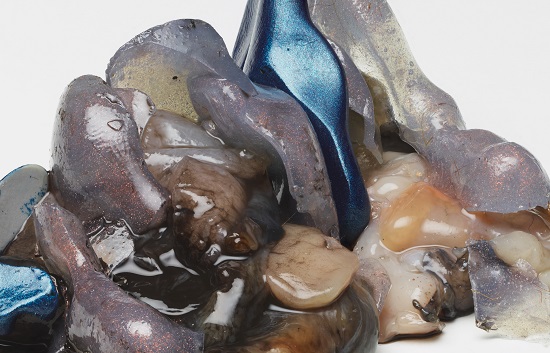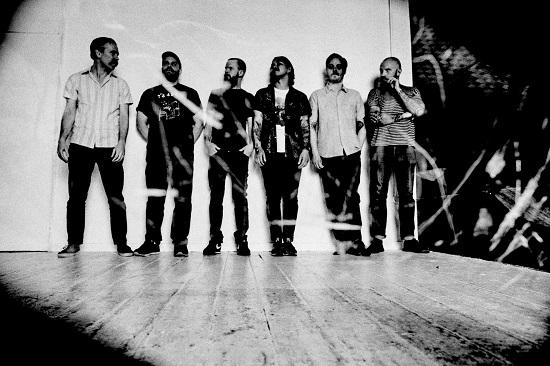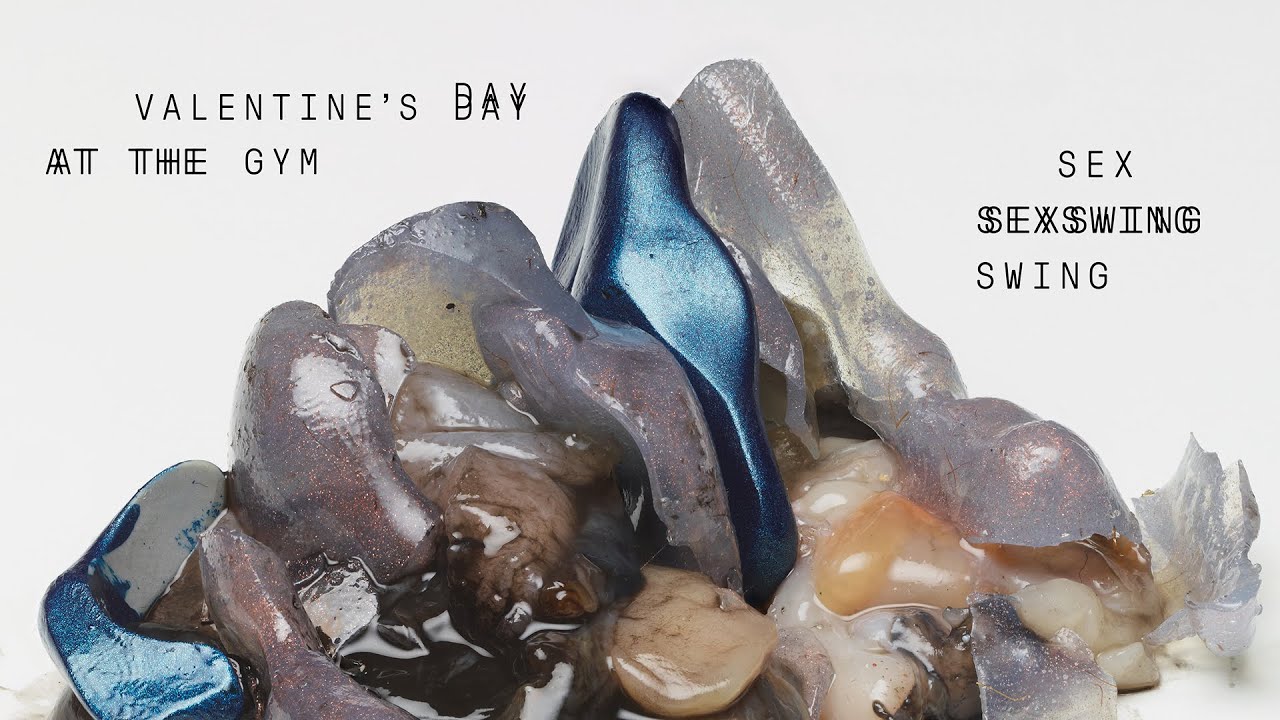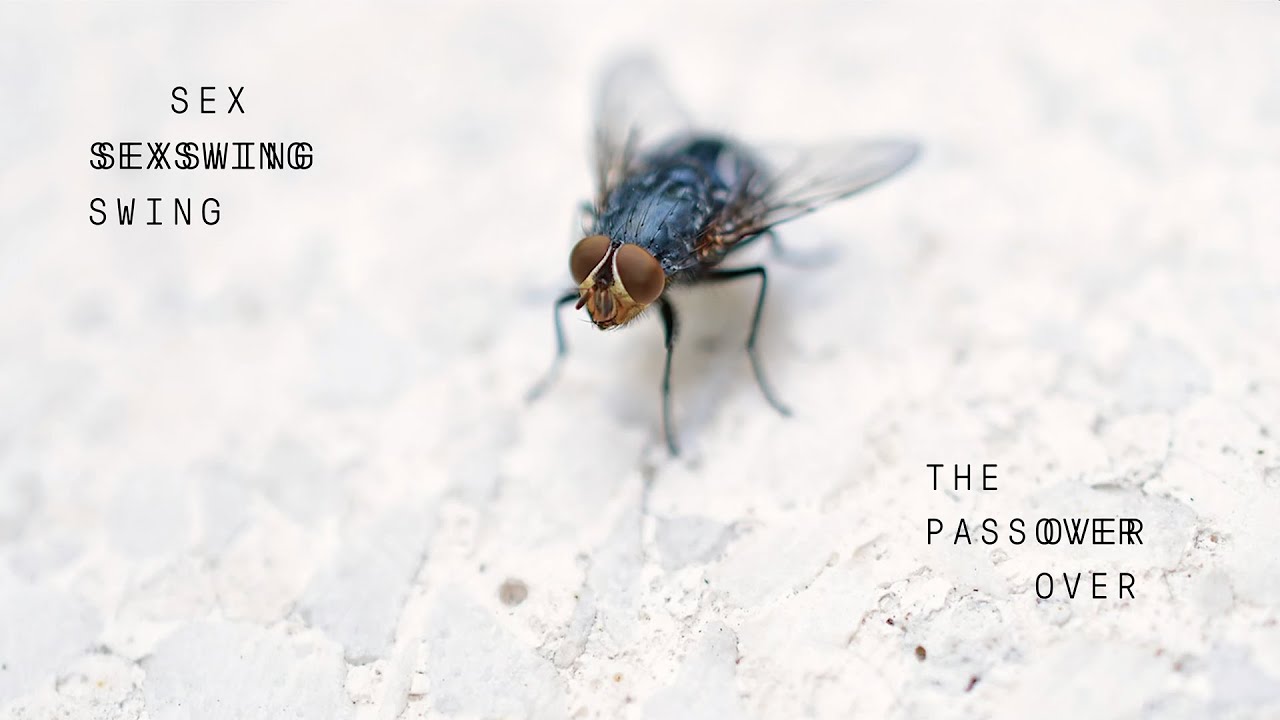Photo: Steve Gullick
There is a reason that almost every time you start a conversation about Sex Swing, their album artwork comes up – on the cover of their self-titled 2016 debut a grim metallic tool punctures an alien membrane, causing a grotesque and gelatinous ooze, part phlegm, part flesh, part melted cheese, to flood the scene. Listening to it is an overwhelming experience, a suitable monstrous cacophony that sludges in every direction. “I think there’s a sort of unspoken aesthetic that we collectively understand the song should become,” says the band’s frontman Dan Chandler over Zoom. “We only know what it is when we get there.”
Next Friday, they release its follow-up Type II, and once again the record sounds the way it looks. The same artist, Alex Bunn, is responsible for the cover, and this time there’s a little more shape, definable edges and a certain glossiness, but though the ooze has started to thicken it looks darker and more putrid than ever. The music has evolved structurally, there’s more of a framework, but what creeps and seeps within is as grizzly as ever. “As soon as we were ready to do a record I knew he would be the guy I was gonna ask," Chandler continues of Bunn. “I think if there is a visual way of summing up how our music sounds, I thought that was it, an organic mess with a few identifiable elements.”

Artwork: Alex Bunn
We’re joined on the call by saxophonist Colin Webster, whose manic avant-jazz squall is the band’s frenzied and untrustworthy helmsman through the sludgy void, and by guitarist Jodie Cox, whose weighty, hammering riffs serve as mighty propulsion. The lineup is completed by bassist Jason Stoll, drummer Stuart Bell and keyboard player Ollie Knowles. Between them, the sextet have comprised parts of Mugstar, Dead Neanderthals, Earth, Bonnacons Of Doom and Dethscalator to name a few, while Part Chimp frontman and former member of Ligament Tim Cedar was their first keyboard player. It is fair to say they have experience when it comes to making extremely loud noises extremely well.
They have been billed on more than one occasion as something of a supergroup, given their respective discographies, but in the four years since their debut Sex Swing has evolved into something more than a side project. “I don’t feel like I’m active in many other things apart from Sex Swing, this is the main band,” says Webster. “Playing mostly improvised music and free jazz [outside of Sex Swing] there’s a lot of collaborations or projects you might do for just one tour or a one off festival gig, so to be in something for six years doesn’t really compare.”
“I think most people who get to our kind of age and have been in a bunch of bands before, it’s an easy way to pin what you might sound like if you’re forming a band, but I don’t think we’re a supergroup! Part Chimp are a relatively successful band for that genre of music, that may have inclined people in that direction, but it doesn’t sound like that now.”
“Now he’s left it’s just us, the nobodies!” jokes Webster.
The musicians create a spark whenever they get together that goes beyond whatever bands they might have been in before, although with Stoll based in The Netherlands and Knowles in Sweden, it’s not that often that the band meet in person. It’s something they turn to their advantage, however, creating their music from bursts of pent up creativity when they get together before an album or tour, embracing its intrinsic immediacy and excitement. “It’s good to have things sparse because it means you don’t kill the momentum with repetition,” says Cox.
“I think if we were practising on a weekly or even fortnightly basis it’d be pretty monotonous,” Chandler adds. “Any unusual events that come out in live performance would evaporate through practise. It allows us to pin down enough of a framework that we can play the songs live but gives enough vitality to those songs because we haven’t over-rehearsed them.”
When they play they are in search of that ‘unspoken aesthetic’ that Chandler mentioned earlier, rather than any sort of finished article. Tracks will often continue to evolve once recorded and released. “They’re frameworks, there’s always this room to change things around depending on how people react,” Webster says.
“I don’t know how else to explain it, I get locked into these grooves and then I enjoy seeing what changes. I like it whether it’s quiet or whether it’s a blown out mess, as long as it’s got that momentum,” says Cox. “If we rehearsed regularly it would strangle it.”

Photo: Steve Gullick
“We kind of know what it is when we get there,” says Chandler. “It’s never something that’s been designed, we just know when we’re doing it.” It’s not the kind of band who can operate under lockdown, he says, “It’s completely the opposite. We write everything live and half of it’s improvised. It would be very tricky to get anything close to a finished piece of music together. Maybe other people are working on ideas [from lockdown], but I’m not.”
The aggression and expression of Webster’s saxophone is crucial amid that indefinable blend that Sex Swing seek. During an early jam before he, Cox or had joined the band, Chandler says it felt as if something was “not quite there.” It was on the recommendation of Gum Takes Tooth’s Tom Fug that they recruit an extra member who might loosen things up. “Most of us had been in bands that had done regimented song structures. I think having that sax in there I think prompted us to be a bit more free with how we perform.”
Knowles’ addition on keyboard, replacing Cedar after he departed in 2017 to focus on Part Chimp also had an important effect. “We had to make a conscious decision to obviously change our sound in a different direction,” the vocalist continues. “I think we thought getting a guitar might be a good idea, getting a different keyboard player. Ollie’s keyboard playing is quite restrained, more subtle than Tims, but it’s more expansive in different ways. Tim’s was straight ahead, down the middle in your face kind of playing, Ollie goes around the sides quite a bit. It added a lot more subtlety, and more layers to how we sound.”
The band spent longer on the record this time around, spending five days in Hasting’s Savage Studios, rather than the 48 hours in Cedar’s Dropout Studios in Camberwell that gave birth to their debut’s hellish, boundless noise. “I love how the first record sounds, but it’s a straight-up recording of the band playing our songs. This time we were trying to be a lot more creative with what we actually wanted to achieve with the production of the record. We picked a really good place, a really big room.”
One reason the record has so much breadth is the influence of outside sources, like Rocket Recordings boss Chris Reeder, who suggested the record be remixed. “He had a good note of what he’d seen live and was sad not to hear on the record. He was generous and constructive. All of us had been thinking different things like that to an extent, but I think it made us more brave when we spoke to Wayne [Adams, of East London studio Bear Bites Horse] who then remixed the album about what we wanted to do with it, and also we said ‘if there’s anything you want to do with it, go nuts’. ”
“He resuscitated it and made it fucking amazing,” says Chandler.
A word like ‘subtle’ is of course relative when it comes to a band like Sex Swing, but nevertheless there’s a refinement to be heard on Type II. It times its explosions more elegantly than before, those peaks of violence becoming even more aggressive for the restraint and foreboding calm that surrounds them. It finds the band expressing more of the intelligence that lies behind their brute strength, the combination of which is frankly terrifying.
Sex Swing’s Type II is out on May 15 via Rocket Recordings




